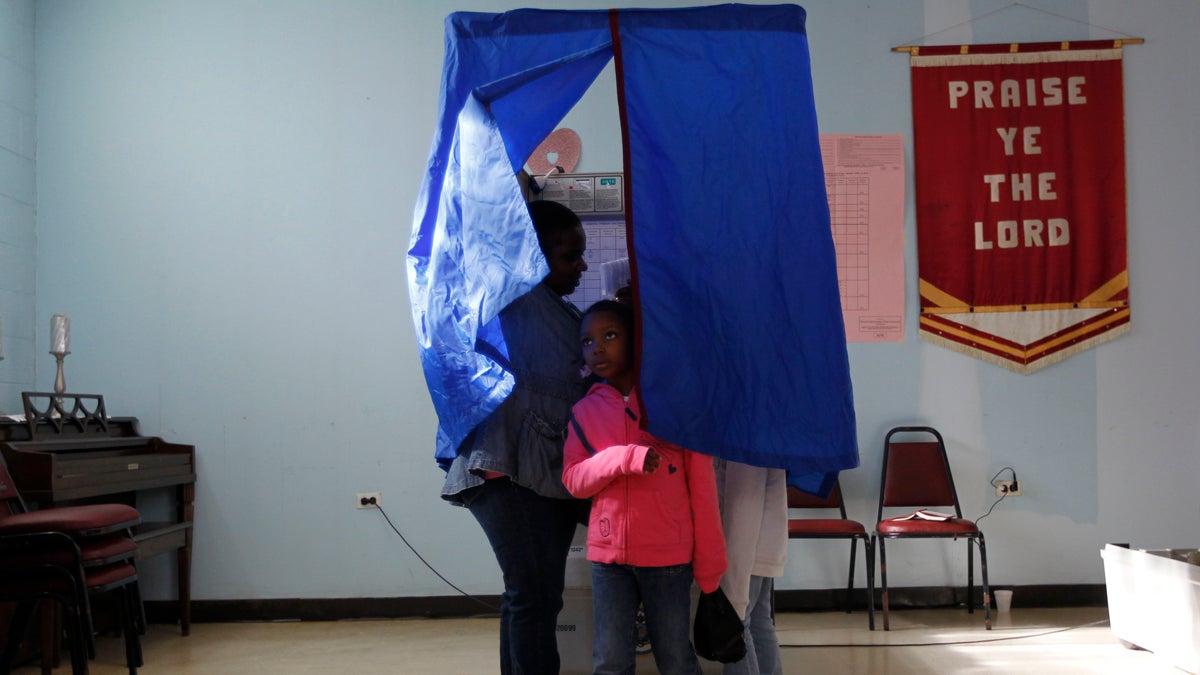As Democratic Party frays, Philly primaries get more interesting

Voters in Pennsylvania's primary election in 2012. (Matt Rourke/AP Photo)
Philadelphia has long been thought of as anti-choice — in the electoral sense, that is. It’s a one-party town, and many city Democrats running for the General Assembly also don’t face opposition in primary elections.
So it will likely come as a surprise to Philadelphia voters that they’ll have more options at the polls Tuesday than in past years.
Fifty-two percent of the city’s House and Senate seats on the May 20 primary ballot are being contested. That figure has been trending upward since at least 2002, when a mere 16 percent of the city’s seats were in contention. (That is the last year for which reliable data is readily available.)
According to data from the Philadelphia City Commissioners, our analysis found:
In 2002, 16 percent of the city’s House and Senate seats (5 of 31) were contested in the primary election
In 2004, 38 percent of the city’s seats (12 of 32) were contested
In 2006, 26 percent of the city’s seats (8 of 31) were contested
In 2008, 28 percent of the city’s seats (9 of 32) were contested
In 2010, 52 percent of the city’s seats (16 of 31) were contested
In 2012, 50 percent of the city’s seats (16 of 32) were contested
In 2014, 52 percent of the city’s seats (15 of 29) are contested
Political analysts said there are likely several reasons for the extra competition, including political polarization, the legislative redistricting process of 2011 and an increasingly fractured Democratic party.
“There’s just really widening differences in state politics and opinions and priorities,” said Beverly Cigler, a state government professor at Pennsylvania State University’s Harrisburg campus. “All of that just induces people who have differing views to want to be listened to and, therefore, you get more contested primaries.”
Larry Ceisler, a political consultant, said another possible explanation is that the city’s Democratic machine is weaker and more fragmented than in past years.
“The party apparatus might not be as strong in terms of getting state representatives re-elected,” he said, “or, at least, striking fear into the hearts of people who might want to challenge them.”
For instance, Democratic City Councilwoman Maria Quiñones-Sánchez is backing a slate of mostly Latino candidates running for the state House and Senate, and none have been endorsed by party leaders.
Ceisler also noted that the General Assembly re-drew the state’s legislative districts in 2011, leaving some districts drastically altered. He said the 202nd, which has been held by Democratic Rep. Mark Cohen for decades, is “almost like a new district.” Cohen is facing a challenger, community activist Jared Solomon, in the primary election.
“It’s really not running against an incumbent,” said Ceisler of Solomon. “It’s really like running for a new seat.”
At the end of the day, though, will any of the primary challengers be successful?
Political observers mentioned Solomon and some of Sánchez’s allies as credible candidates. Another race to watch is in the 4th district: Brian Gralnick and Art Haywood are seeking to unseat Democratic state Sen. LeAnna Washington, who is considered vulnerable because she is facing corruption charges.
However, political scientist Terry Madonna predicts that the vast majority of incumbents in the Philadelphia delegation will hold onto their seats. According to his research, state lawmakers have won re-election in recent years more than 90 percent of the time.
“I suspect when the general election is done in November, the state legislature will have a 90 percent-plus re-election rate” again, he said.
WHYY is your source for fact-based, in-depth journalism and information. As a nonprofit organization, we rely on financial support from readers like you. Please give today.

